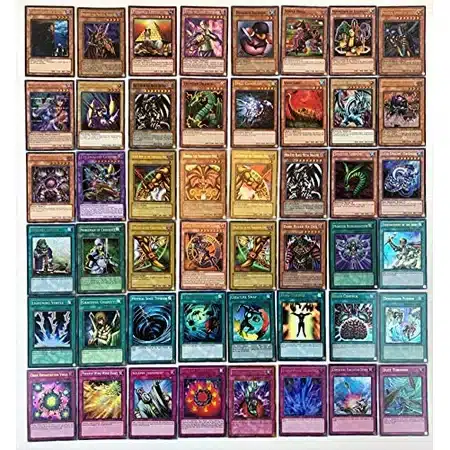Yu-Gi-Oh! cards have carved out a niche in the trading card game industry ever since Konami introduced them in 1999. Originating from the expansive Yu-Gi-Oh! franchise that encompasses manga, anime series, and a plethora of video games, these cards have not just captivated fans of the series but have also become a cornerstone in the trading card community. With an array of intricate designs featuring monsters, spells, and traps, Yu-Gi-Oh! cards invite players into a world of strategic gameplay and collection. The global fascination with these cards has turned the hobby of collecting Yu-Gi-Oh! cards into both a passionate pastime and a lucrative business.
Understanding the Value of Yu-Gi-Oh! Cards
Rarity of the Cards
In the world of Yu-Gi-Oh! cards, rarity is a key determinant of a card’s worth. The market assigns greater value to rarer cards, which means understanding where your cards fall in the rarity spectrum is essential. Rarity levels range from the common cards, which are widely available, to the elusive ultra rares, which are sought after by serious collectors. Knowledge of these categories is the first step in appraising your collection and setting realistic, profitable prices.
Card Condition
The physical state of a Yu-Gi-Oh! card is a major factor in its valuation. Cards maintained in mint condition, showing no signs of wear and appearing as if they were just pulled from a pack, are at the apex of the value chain. Those in near mint condition have only slight imperfections, often barely noticeable, while cards in poor condition exhibit visible wear and tear, which significantly depreciates their value. Card condition affects not only the price but also the speed at which a card will sell, as collectors often prioritize the preservation of the cards they acquire.
Market Demand
A card’s price is not set in stone; it ebbs and flows with the tides of market demand. Cards that enjoy widespread popularity or those that hold a special place in a competitive deck tend to fetch higher prices. Seasoned sellers keep a vigilant eye on market trends, player forums, and tournament results to gauge which cards are in demand. This insight into the market’s current inclinations is indispensable for pricing cards competitively.

Preparing your Yu-Gi-Oh! Cards for Sale
Ensuring the Quality of the Cards
To make your cards appealing to prospective buyers, they must be presented in the best possible condition. This involves safeguarding them from the elements—dust, moisture, and anything that could scratch or dent them. Cards should be stored in protective sleeves, preferably in a climate-controlled environment, to prevent any deterioration in quality. The preservation of your cards is not only about maintaining their condition but also about presenting yourself as a credible and careful seller.
Appropriate Packaging of Cards
Proper packaging is another critical step in the selling process. When a transaction is made, the cards need to be packed securely to ensure they arrive at their new destination in the same condition they left. Appropriate packaging materials, like bubble wrap and hard-top loaders, can prevent damage during transit. Good packaging not only protects the cards but also reflects on your reputation as a seller—it demonstrates attention to detail and a commitment to customer satisfaction, which can lead to repeat business and positive reviews.
12 Best Ways to Sell Yu-Gi-Oh! Cards
Determining the Price for Your Cards
- Pricing Based on the Card’s Rarity The rarity of a card significantly influences its market value. Typically, the more uncommon a Yu-Gi-Oh! card is, the more valuable it becomes. Cards that are limited edition, promotional, or have unique attributes tend to fetch higher prices. Rarity is often indicated by specific symbols or colors on the card, and understanding these markers is crucial for accurate pricing. Additionally, collectors often seek out rare cards to complete their collections, making them highly desirable and justifying a higher price point. When setting prices based on rarity, it’s essential to stay informed about the collector’s market and rarity trends to ensure competitive and fair pricing.
- Pricing Based on Market Demand Market demand is another crucial factor in determining the price of your Yu-Gi-Oh! cards. A card’s popularity, driven by its utility in gameplay or its iconic status in the community, can greatly influence its demand. Monitoring forums, online marketplaces, and trend reports can provide insights into which cards are currently sought after by collectors and players. Prices may fluctuate based on new game releases, tournament outcomes, or changes in the competitive landscape. Keeping a close eye on these trends allows for dynamic pricing that reflects the current market demand, ensuring that your cards are priced both competitively and attractively.
Online Selling Platforms
- Ebay Ebay stands as one of the most accessible and widely used platforms for selling Yu-Gi-Oh! cards. Its large and diverse user base makes it a prime marketplace for reaching a wide audience of potential buyers, from casual collectors to serious players. Utilizing Ebay’s selling tools, such as detailed product descriptions, high-quality images, and strategic keyword usage, can significantly enhance the visibility and appeal of your listings. Furthermore, Ebay offers various selling formats, including auctions and fixed-price listings, providing flexibility in how you choose to sell your cards.
- Amazon Amazon is another robust platform for selling Yu-Gi-Oh! cards, offering access to a massive customer base. Sellers can choose to list their cards as individual sellers or open a professional seller account for larger volumes. The platform provides a structured and secure environment for transactions, which can be particularly appealing to both new and experienced sellers. Additionally, Amazon’s review system can help build credibility and trust among buyers, which is essential for long-term selling success.
- Specialized Card Trading Sites Specialized card trading websites, like TCGPlayer and Cardmarket, cater specifically to the collectible card community. These platforms are tailored for trading card sales, providing features and tools that are conducive to card transactions. Their user base consists of dedicated collectors and players who are often looking for specific cards, making them ideal for targeted selling. These sites often offer market insights, pricing tools, and community forums, which can be invaluable resources for sellers to price and promote their cards effectively.
Offline Selling Platforms
- Local Card Shops Selling Yu-Gi-Oh! cards at local card shops is a straightforward and personable approach. These shops often cater to a dedicated customer base of card game enthusiasts, providing an ideal environment for selling directly to your target audience. You can negotiate deals directly with the shop owners or use their consignment options, which allows your cards to be displayed and sold in the store. Furthermore, local card shops often host events and tournaments, providing additional opportunities to showcase and sell your cards to an engaged community.
- Trade Shows Participating in trade shows and collectible conventions presents an opportunity to sell your Yu-Gi-Oh! cards to a concentrated audience of enthusiasts and collectors. These events are bustling marketplaces where buyers are often willing to pay a premium for rare or sought-after cards. Trade shows offer the benefit of direct interaction with potential buyers, allowing for immediate feedback and negotiation. They also provide a platform for networking with other sellers and collectors, which can be beneficial for future sales and exchanges.
- Yard Sales Yard sales offer a more casual setting for selling Yu-Gi-Oh! cards. This method can be particularly effective if you live in a community with an interest in collectibles and trading card games. Yard sales allow for face-to-face interactions with buyers, enabling on-the-spot negotiations and sales. While this method may not reach as wide an audience as online platforms, it can be a convenient way to sell cards without dealing with shipping and online transaction fees.

Auction vs. Fixed Price
- Pros and Cons of Auction Auctioning Yu-Gi-Oh! cards can be an exhilarating way to sell, often leading to higher-than-expected sale prices for rare or in-demand cards. The competitive nature of auctions can drive up prices, especially if multiple bidders are interested in the same card. However, auctions carry the risk of cards selling for less than their market value if there isn’t enough interest or if the auction isn’t adequately promoted. Timing, presentation, and understanding the auction platform’s dynamics are crucial for a successful auction.
- Pros and Cons of Fixed Price Setting a fixed price for your cards provides more control over the selling process, ensuring that you receive a predetermined amount for each card. This method is less risky than auctions and is straightforward for both the seller and the buyer. However, the challenge lies in setting a price that is attractive to buyers but also reflective of the card’s value. Overpricing can deter potential buyers, while underpricing can result in lost revenue. Researching current market prices and adjusting your prices according to market trends and card conditions is essential for successful fixed-price sales.
Effective Advertising Strategies
- Using Social Media for Promotion Leveraging social media platforms is an excellent way to promote your Yu-Gi-Oh! cards to a broad audience. Platforms like Instagram, Facebook, and Twitter allow you to showcase your cards through high-quality images and engaging posts. Using hashtags, participating in online communities, and interacting with followers can increase the visibility of your cards. Social media also provides an opportunity to tell a story about your collection, engage with potential buyers, and build a following, all of which can enhance the appeal of your cards and increase the likelihood of successful sales.
- Using Word-of-Mouth Marketing Word-of-mouth marketing remains one of the most powerful advertising strategies, particularly in niche communities like collectible card games. Encouraging satisfied customers to share their positive experiences with friends, family, and fellow collectors can organically expand your reach. Building a good reputation through excellent customer service, fair pricing, and reliable transactions can lead to recommendations and repeat business. Engaging with local card game communities, participating in forums, and attending card-related events can also help in fostering relationships that lead to word-of-mouth referrals.
Safe Payment Methods
In today’s digital era, ensuring safe and secure payment methods is paramount. It not only helps in fostering trust among buyers but also aids in the smooth functioning of your trading card business. Here are some of the top payment methods you might consider:
Secure Online Transfers
One of the widely used methods for online transactions is through secure online transfer systems. Platforms like PayPal have become synonymous with safety. They have built a reputation for providing encrypted and secure transfers while safeguarding sensitive financial information. Such platforms also come equipped with measures that protect both buyers and sellers from potential fraud, ensuring that transactions go through only when both parties are satisfied.

Cash on Delivery
While the digital wave is strong, there’s still a place for traditional methods, especially in offline transactions. Cash on delivery, for instance, offers a straightforward and instantaneous payment method. It’s particularly beneficial in cases where buyers are skeptical about upfront payments or where they prefer physically inspecting the product before parting with their money.
Trade-In
In the world of trading cards, value is subjective. A card that may seem invaluable to one might be of immense worth to another. Embracing the concept of trade-ins can not only help in diversifying your collection but also in ensuring sales. By accepting cards of perceived equal or greater value in lieu of money, you open doors to unique transactions that can be profitable in the long run.
Ensuring Safe Packaging
The journey from your storage to the buyer’s hands can be fraught with risks – jostling, exposure to the elements, or even mishandling. It’s imperative to package your cards with utmost care. Using resilient packaging materials like bubble wrap, hard card sleeves, or padded envelopes can shield your cards from potential damage. Remember, a safely delivered card not only ensures customer satisfaction but also cements your reputation as a reliable seller.
